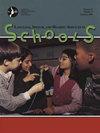发展性语言障碍儿童的单词检索次数与训练后延迟后的检索呈正相关。
IF 2.9
3区 医学
Q1 AUDIOLOGY & SPEECH-LANGUAGE PATHOLOGY
Language Speech and Hearing Services in Schools
Pub Date : 2025-08-05
DOI:10.1044/2025_lshss-24-00170
引用次数: 0
摘要
目的对于典型发育的成人和儿童,目标项目成功检索的训练次数与训练后检索成功的概率呈正相关。在发育性语言障碍(DLD)儿童的单词学习干预中,确定训练表现与训练后检索之间的关系有可能为临床实践提供信息。为了确定这种关系,我们对Storkel对幼儿园DLD儿童的互动阅读干预数据进行了二次分析。方法:儿童完成了为期15期的双周阅读干预。管理员跨会话遍历5本书和相关的目标单词。每个目标单词都被训练,单词的形式和意义被评估,共6次。在目前的分析中,评估了在训练结束时以及在4周、8周和12周后正确产生形式或意义的会话次数与检索形式或意义的概率之间的关系。结果训练时成功检索单词的会话数与训练后延迟检索的概率呈正相关。形式和意义都是如此。结论:目前的研究结果表明,DLD儿童应该能够在多个会话中成功地检索单词的形式和含义,以支持训练后的记忆。讨论了临床干预的意义和对未来研究的建议。补充MATERIALhttps: / / doi.org/10.23641/asha.29591660。本文章由计算机程序翻译,如有差异,请以英文原文为准。
The Number of Sessions Children With Developmental Language Disorder Retrieve Words Relates Positively to Retrieval After Extended Post-Training Delays.
PURPOSE
For adults and children with typical development, the number of training sessions a target item is successfully retrieved relates positively to the probability of successful post-training retrieval. Determining the relationship between training performance and post-training retrieval during a word learning intervention for children with developmental language disorder (DLD) has the potential to inform clinical practice. To determine this relationship, secondary analyses of data from Storkel's interactive book reading intervention for kindergarten children with DLD were conducted.
METHOD
Children completed a biweekly book reading intervention across 15 sessions. The administrator cycled through 5 books and the associated target words across sessions. Each target word was trained, and the word's form and meaning were assessed, during 6 sessions. In the current analyses, the relationships between the number of sessions that the form or meaning were produced correctly and the probability of retrieving the form or meaning at the end of training and after 4-, 8-, and 12-week delays were assessed.
RESULTS
The number of sessions that a word was successfully retrieved during training was positively related to the probability of retrieval at post-training delays. This was the case for both forms and meanings.
CONCLUSIONS
Current results suggest that children with DLD should successfully retrieve word forms and meanings across multiple sessions to support post-training retention. Implications for clinical interventions and suggestions for future research are discussed.
SUPPLEMENTAL MATERIAL
https://doi.org/10.23641/asha.29591660.
求助全文
通过发布文献求助,成功后即可免费获取论文全文。
去求助
来源期刊

Language Speech and Hearing Services in Schools
Social Sciences-Linguistics and Language
CiteScore
4.40
自引率
12.50%
发文量
165
期刊介绍:
Mission: LSHSS publishes peer-reviewed research and other scholarly articles pertaining to the practice of audiology and speech-language pathology in the schools, focusing on children and adolescents. The journal is an international outlet for clinical research and is designed to promote development and analysis of approaches concerning the delivery of services to the school-aged population. LSHSS seeks to advance evidence-based practice by disseminating the results of new studies as well as providing a forum for critical reviews and meta-analyses of previously published work.
Scope: The broad field of audiology and speech-language pathology as practiced in schools, including aural rehabilitation; augmentative and alternative communication; childhood apraxia of speech; classroom acoustics; cognitive impairment; craniofacial disorders; fluency disorders; hearing-assistive technology; language disorders; literacy disorders including reading, writing, and spelling; motor speech disorders; speech sound disorders; swallowing, dysphagia, and feeding disorders; voice disorders.
 求助内容:
求助内容: 应助结果提醒方式:
应助结果提醒方式:


